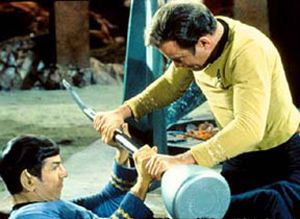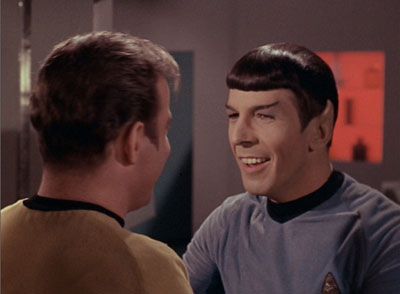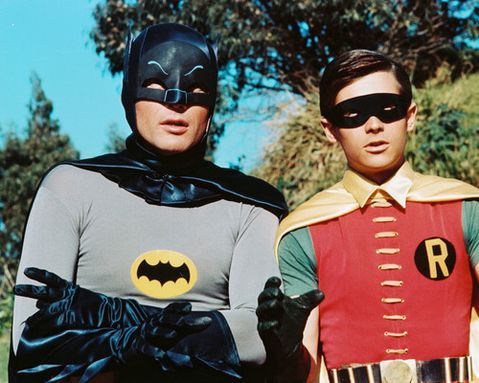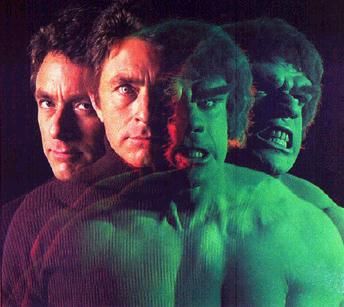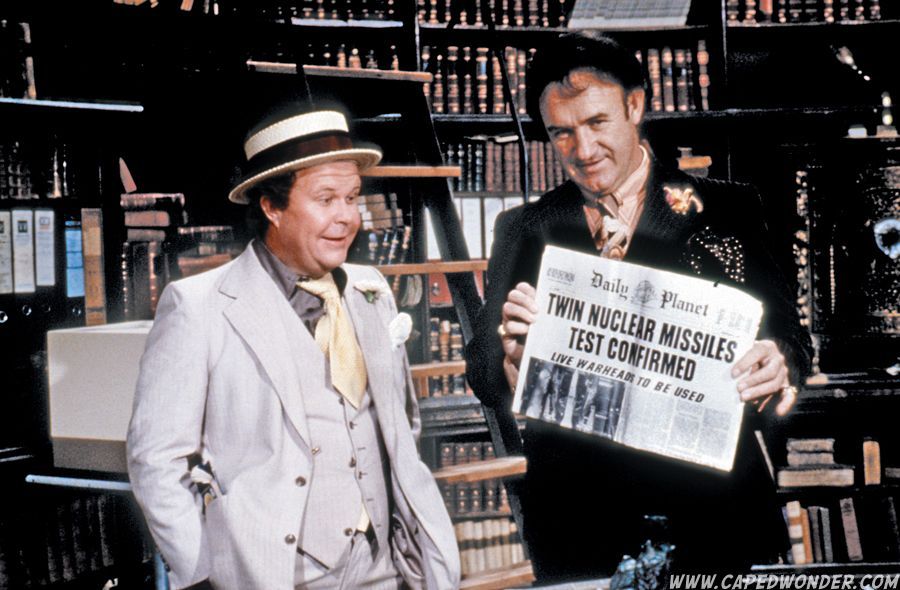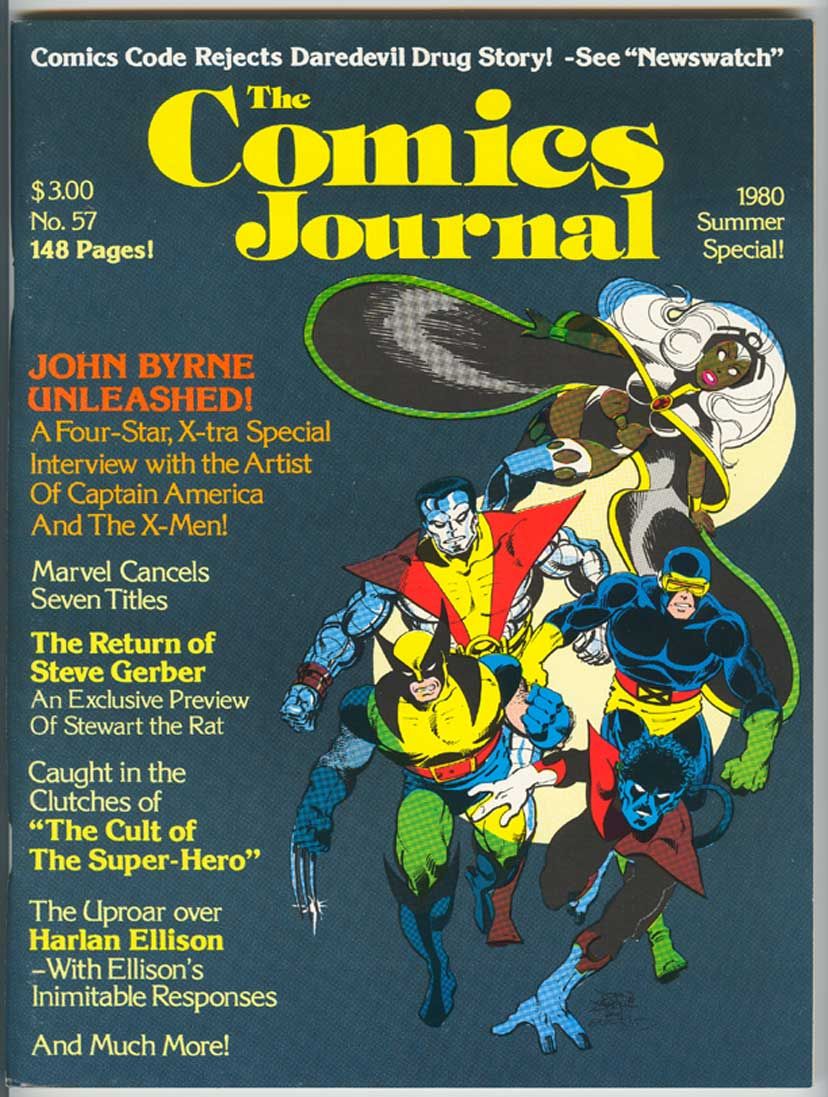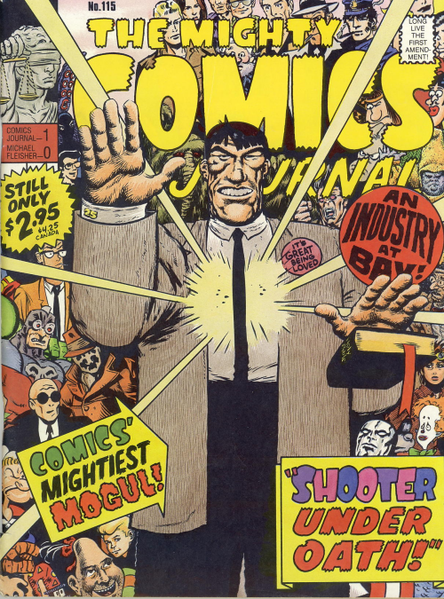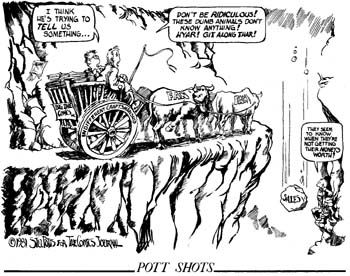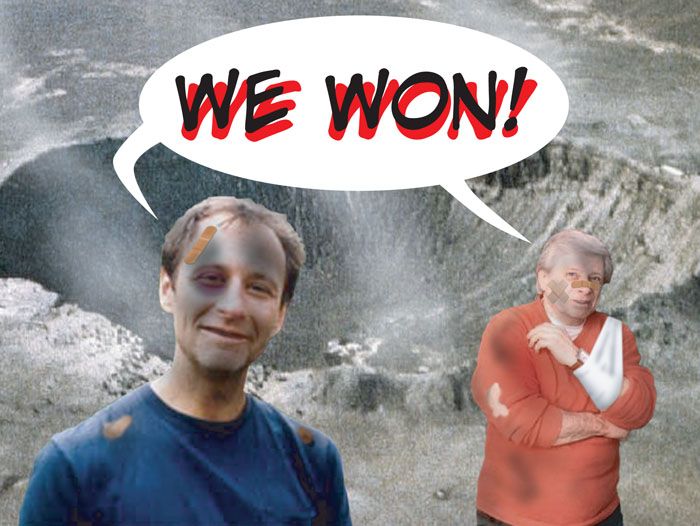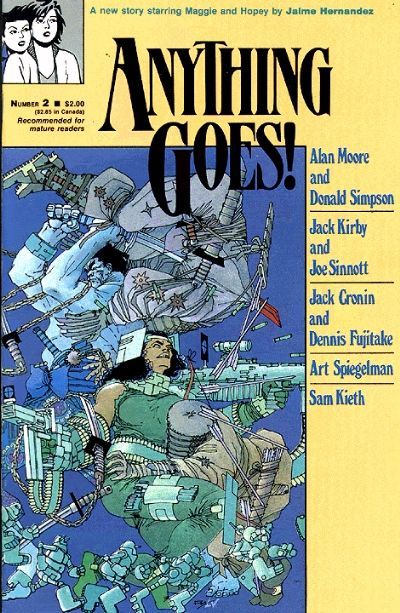It's been a weird week here.
See, my wife is so excited about us being in Newsweek that she has been telling everyone about it. The usual response is polite interest: "Oh, Julie told us you were in Newsweek. How did that come about?"
Then I have to explain that, well, I write this weekly thing about comics along with some other guys and Newsweek wanted to ask us about Spider-Man and Mary Jane splitting up. And as the explanation goes on and I hear myself saying things like, "No, it's got nothing to do with the movies -- it's just in the comics. Well, some of the comics, what they call the mainstream Marvel Universe... um, no, it wasn't a divorce, it was a sort of magical, uh..." By then generally I feel so foolish that I give up and finish with, "You know, if you really want to know all the ins and outs of it, you have to study about twenty years' worth of comics, and most of them aren't even all that good. Basically it's just that they wanted to ask me why the fans were so upset."
And you know what the joke is? I don't think I ever actually told the nice Newsweek lady my REAL answer to that question.
Why were the fans so upset? Because fans are always upset. It's what we do.
I have to admit, I read our Dread Lord and Master's challenge last week with some amusement:
Heck, for bonus points, just tell me a comic book controversy that you think was bigger than this one, period (and it has to be internet era, consarnit!)!
My first thought was: He's kidding, right? This Spider-Man thing is bigger than Hal vs. Kyle? Bigger than Dr. Light's rape scene? Does he mean just Marvel? Second thought: Why internet-era? It's been going on as long as there have been fans. Then my third thought was, Hey, you know, I bet I could get a column out of looking at some of the PRE-internet-era blowups... after all, Ye Olde Geezer Stuff is kind of my beat at CSBG.
So come with me, back to the days of yore, when we got our comics chiseled on stone tablets -- and fans and creators were still always really pissed off about SOMETHING.
*
Okay, let's set some guidelines. I'm the first one to admit that yeah, some of these things were genuinely divisive and upsetting and worth getting angry about. That's not the point. I'm just rattling off the ones I remember that are as big as Spider-Man's current flap as far as fan outrage is concerned.
Secondly, some made the papers and some didn't. However, I don't think that matters one way or the other. I am going to politely disagree with Brian and suggest that press interest is not a measure of 'bigness.' Let's face it, the press has only the vaguest idea of what goes on in the comics industry. They covered 'Death of Superman' like it was news, which as far as I'm concerned is about the equivalent of AP rushing a story on to the wires in 1967 with the headline, STAR TREK KILLS CAPTAIN KIRK!! forty-five minutes into the episode "Amok Time."
...without waiting for the big reveal at the end. (Turned out Captain Kirk was all right. Sorry to spoil it for you.)
Anyway, to my mind, what makes them fair game for a list like this were two things: 1) everyone in and around comics was talking about them, and 2) when you talked about them, you took sides. No neutral ground, no "I don't really pay attention to that stuff..." -- while they were going on, fans were angrily demanding that, by God, if you cared about the future of comics then you better decide what horse you were backing in this race.
*
Here's an easy one: That movie/television show is the worst thing that could happen to superhero comics!!
What movie? What show? Hell, pick one out of a hat. I remember kids getting into actual fistfights over Adam West's depiction of Batman.
I am somewhat embarrassed to admit that a couple of times in my youth, one of those kids was me. I've actually been on both sides of it, which is even more embarrassing. (When I was in the first grade, I had to defend the honor of my Batman lunch box. When I was in junior high, I was angrily telling people that Batman was dark and scary and the show was nothing LIKE the comics, damn it!)
That's always how it shakes out, of course -- this quarrel really translates to, "Will this filmic adaptation help us or hurt us, image-wise, with the non-fans out there?" Because if there's one thing fans care about, it's what we look like to the outside world. I remember how everyone was cautiously optimistic about the Universal deal for the Marvel characters -- because they were SERIOUS!! Except, of course, for the fans who saw the shows and howled to the skies about how inaccurate they were.
Opinion was also terribly divided over the Chistopher Reeve Superman movies, because there were serious parts AND jokey parts. All those old-time comics fans talking today about what classics those first two films are and how much they love them? They're lying. At least half of them are, anyway.
Because I assure you there was every bit as much vituperation over Luthor employing someone like Ned Beatty's Otis as there was a couple of years ago over casting Jessica Alba as Sue Storm. Hell, there was rage over Gene Hackman's Luthor wearing a rug. "Out of character!" "Not true to the books!" "Treating them like jokes!" For fans, it doesn't matter what TV show, movie, or cartoon we're talking about. That brushfire's ALWAYS ready to go another couple of acres.
And so on. It really is a silly argument, because I assure you, in my forty-plus years of being the geek-culture go-to guy for everyone of my acquaintance, no one who's not a fan gives a damn about whether or not the show matches the source material. Really, they don't.
You know what does hurt us in terms of image? The loud fights about the stuff. Just saying.
Nevertheless, this movie/TV argument really has legs. Look at any message board. The latest iteration of it seems to be the disputes over Heath Ledger's Joker makeup in The Dark Knight. I'll grant you that any ONE instance of it tends to come and go -- I think everyone's over Tobey Maguire's organic webshooters now -- but the overall argument, is-this-superhero-film-helping-or-hurting-comics? ....it's always THERE, doing a slow boil on the message boards and around the blogosphere.
*
A classic from the 80's that still is occasionally cited in histories of both comics and also of gay imagery in pop culture: Marvel Comics hates gay people.
This dated from an interview the Comics Journal did with John Byrne, the hot new artist of the X-Men. Byrne's remarks read as blunt, tactless, and occasionally belligerent.
I know -- John Byrne being blunt! Who would have guessed?
But at the time, it was a bit of a shock, especially when Byrne casually tossed off the expression, "faggot-queer-homo" in a disparaging way. As we all know, X-Men under Claremont always had a pretty big gay following -- not like Wonder Woman's or anything, but there were a lot of them that identified with the hated-outcast/prejudice plots Claremont was working -- and those gay fans were horrified. They deluged the Journal and Marvel with letters -- actual letters on paper, you know, as we did in the olden times.
Then it really hit the fan with the infamous shower scene in Hulk #23, where Bruce Banner is hassled by a couple of rough-trade guys at the local Y.
That settled it for most fans. Marvel had a vendetta. They were bigots. They hated gays. "Disprove it, you hate-mongering bastards!"
The more Jim Shooter talked about it, the worse it got. His defenses were always combative -- it was based on a real incident, it was about rape and not homosexuality, if he'd offended RAPISTS he was GLAD, and so on. It raged in the pages of the Journal for months afterwards.
As for Byrne, I've often thought that the character of Northstar in Alpha Flight, and later that of Maggie Sawyer in Superman, sprang at least in part from John Byrne's need to defend himself from that bigotry charge. It dogged him for years.
*
Shooter, on the other hand, generally had bigger fish to fry. The anger you see today for Dan Didio or Joe Quesada is as nothing compared to the sheer spit-spraying hatred heaped on Jim Shooter during his tenure as Marvel editor-in-chief. There were at least three or four years in the eighties where there was always-- always! -- SOMEONE in comics who was livid with Jim Shooter and Marvel in general. Jim Shooter is Evil! didn't quite have the legs of some of comics' other controversies, but it has had some serious staying power.
Certainly, for Gary Groth and Fantagraphics, it verged on a jihad. The corporate culture of comics that Jim Shooter personified, the idea of comics as juvenile entertainment product, offended their indie sensibilities on pretty much every level.
What it really was coming from was pretty simple -- Jim Shooter had trained under Mort Weisinger at DC, and Weisinger ran his office with an iron fist. That was how it was done. The trains ran on time. So when Shooter ascended to the top position at Marvel, the first thing he did was abolish the "writer/editor" position. There would be no more writers serving as their own editors. Period. Didn't matter if you were Roy Thomas on Conan or Marv Wolfman on Dracula, didn't matter how many Shazam and Eagle Awards you had stacked up, didn't matter how amazing and groundbreaking you were, you were going to by God show some discipline and get the books back on schedule. And that meant accountability. Worse, it meant supervision.
Or, as a friend of mine put it, "Hide the dope, Dad's coming home. The party's over."
So there was a massive exodus at Marvel of angry writers who were suddenly having their autonomy taken away -- Roy Thomas, Marv Wolfman, Len Wein, I forget who-all else. DC was only too happy to offer them a new home -- though I don't think anyone got an equivalent writer/editor position to what they'd had before. At the same time, Denny O'Neil moved from DC over to Marvel, so it really did look like some sort of exchange. At the time, the Comics Journal wondered, "Do the people leaving Marvel for the freedom of DC ever bump into the people leaving DC for the freedom of Marvel when they're crossing the street?"
However, the Marvel exiles unanimously agreed on one thing -- that it was Jim Shooter's fault.
With the advantage of hindsight, you can see both sides of it. Shooter had been given an assignment and he was doing his best. And Marvel really WAS a mess. On the other hand, the tightly-run entertainment factory under Shooter never really matched the glories produced by the anarchy of the 1970's. The debate essentially boiled down to, Was it worth the occasional missed deadline and the trainwrecks like Skull the Slayer if it also gave you stuff like "Panther's Rage," Englehart/Brunner Dr. Strange, Gerber/Colan Howard the Duck, and so on? Some said no, others said yes, and there was the split. Indie vs. mainstream, art vs. commerce -- another comics perennial.
*
Or how about -- Let's Play The Feud!
Who's feuding? Someone always is, for sure. And like the TV/movie thing, these various individual disputes may resolve or blow over, but when you look at the overall picture, it's never absent; there's always SOMEONE venting about how some other guy is a no-talent hack, a return snipe from the accused, and shortly thereafter two groups of fans willing to take up the banner and enter into combat. The consistency of it is alarming. Now it's on the internet, but I assure you, it's nothing new -- these various feuds have been going on for years, and back in the day, every one of them was playing out in the letters pages of Comics Buyers Guide and The Comics Journal and Comics Feature. I remember Steve Englehart versus Gerry Conway over how Englehart left the assignment on Avengers, there was John Byrne calling Roy Thomas the "Super-Adaptoid" because he spent so much time adapting other works to comics, there was Peter David holding the Image founders accountable for every stupid thing they said in their press conferences (and there were a lot of them) -- and -- of course -- you had Groth versus Harlan Ellison versus Michael Fleisher. Talk about staying power -- that last one just flared up AGAIN, still going strong after twenty-five years. Googling around for images to use I found this one, really too funny not to share. Courtesy of Ansible.
Kind of says it all, doesn't it?
It's mostly a joke today, but while it was going on, the Fleisher lawsuit was serious business; not just for the participants, but for the spectators. You could tell where the battle lines were drawn by who was willing to contribute to Fantagraphics' benefit book (to offset their legal costs) and who wasn't.
The weird thing was, a lot of comics people didn't care about the merits. There was a very real sense that "Groth's had it coming for a long time and here it is. I don't care about First Amendment rights. Bastard said I was a soulless corproate hack. Screw him. I hope he goes under."
There were reports of Fantagraphics supporters vs. Fleisher supporters getting into it at conventions. Nowadays it's the Fantagraphics fans versus the Ellison fans, but it tends to break the same way as far as those fans are concerned -- on friendship lines, or whose work you're a fan of, as opposed to the merits.
Even the fan press itself isn't immune -- because, of course, in comics journalism, you don't just report, you have to pick a side. There was a memorable couple of months there in the 1980's where Comics Buyers Guide and the Comics Journal were going at it hammer and tongs over the legitimacy of doing superheroes work-made-for-hire. Probably the low point there was when Don Thompson opined in the pages of CBG that writing superheroes was like being a coal miner -- you were paid to haul the coal, that didn't mean you got a share in the mine. Yes, this was the level of debate. Kind of makes Joey Q's recent incoherent defenses of Marvel policy look like Clarence Darrow-level rhetoric, doesn't it?
*
I could go on and on. And, I bet, if you think about it, so can you. We visited our old friend comics historian Kurt Mitchell last night and I told him what I was kicking around for a column this week. He promptly rattled off half-a-dozen more examples. (Remember the "Name Withheld" 1990's foofaraw in Comics Buyers Guide about whether or not comics artists even needed writers at all? I'm still astonished that got as much traction as it did.)
The real question is, why are we fans so contentious and cranky all the time? Kurt and I wrestled with that one for a while last night and finally gave up.
Is it just passion for the stuff? Is it that we, on some level, enjoy all this sturm und drang? Scratch a comics fan and find a drama queen? I don't know.
Maybe it's as simple what Laura "Tegan" Gjovaag said to me at Emerald City last year. "I used to think we were the geeks. But really everybody's geeky about something. You ever see knitting fans when they get together? Now those people are crazy."
I shudder to think.
See you next week.

